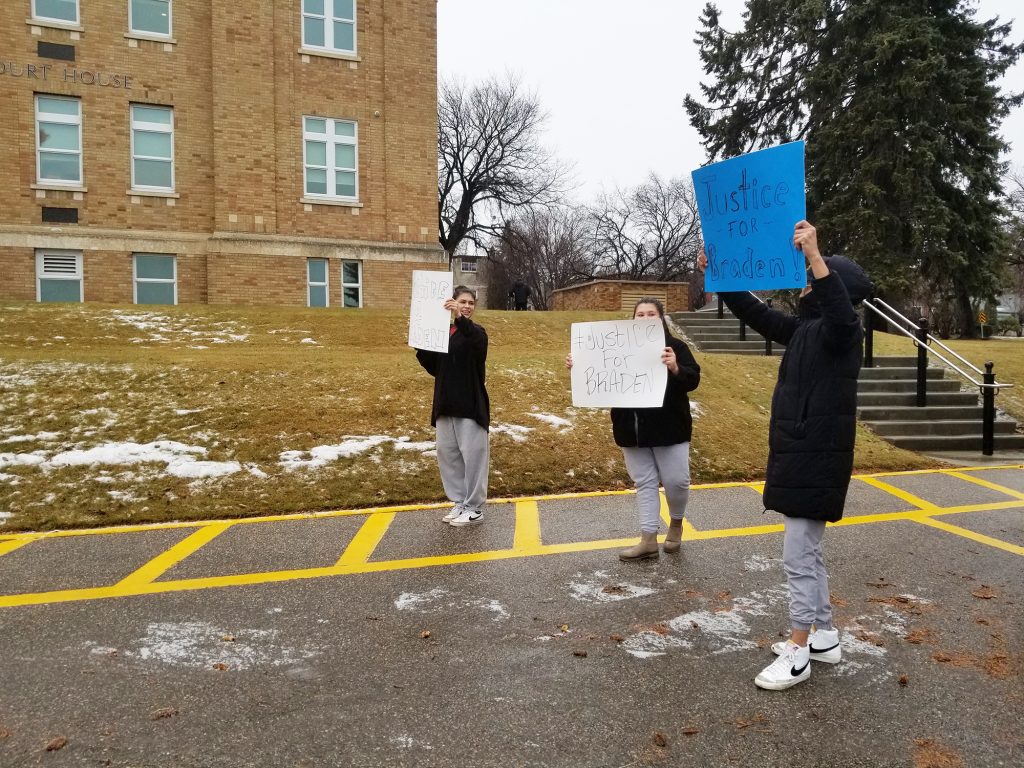
This story may contain details that will disturb some readers.
Lawyers for a former RCMP officer accused of first-degree murder argued the killing was haphazard, panicked, and “extremely unplanned” during closing arguments at the Court of King’s Bench on Wednesday.
Darren Kraushaar, the lawyer representing former Prince Albert RCMP officer Bernie Herman, described the circumstances leading up to the shooting of 26-year-old Braden Herman, no relation, as a “comedy of errors” during his closing remarks. Meanwhile, Crown Prosecutor Jennifer Schmidt focused her remarks on the credibility of Bernie Herman’s testimony, arguing other evidence like text messages, social media messages, and testimony from Herman’s fellow police officer and friend, Staff Sgt. Chad McLeod, were more reliable.
Kraushaar opened by arguing that “a significant body of evidence” was circumstantial. He said there was no evidence the shooting was planned or deliberate, and argued Bernie Herman’s actions following the killing were not in line with someone who intentionally planned out a murder.
Kraushaar pointed to evidence showing Bernie only shot Braden once after the pair drove to a secluded spot on the northern outskirts of Prince Albert. He described their final meeting as a “highly emotional situation” that led to Bernie firing his gun out of a state of panic, rather than cold calculation.
He also said Bernie never stopped to check if Braden was dead, something he argued was unusual if Bernie had planned to kill his victim.
When Bernie testified in his own defence earlier in the trial, he told the court Braden appeared to be bending over to pick up an object, and worried it was some kind of weapon. Given the history of violent altercations between the two, Kraushaar argued it was understandable Bernie would become panicked.
Braden’s body was found naked with one bullet in it, and no man-made weapon nearby. According to autopsy reports, the bullet entered Braden’s body in the arm from a downward angle, passing through the torso and into his liver.
Kraushaar described the relationship between Braden, Bernie, and Bernie’s wife as complicated and, at times, toxic. He said Bernie’s relationship with Braden had good moments, bad moments, moments of violence and fear, and moments of consensual sex.
Kraushaar argued there was nothing unusual about Bernie being angry or upset the morning of the shooting. He also argued Bernie had good reason to fear Braden, citing multiple violent altercations, including one where Braden was accused of kicking Bernie’s wife in the head after she slipped and fell.
Kraushaar argued that there was “no right way” for a victim of violence to behave, and said Bernie had a difficult time separating himself from Braden because the latter would show up at his house uninvited.
Kraushaar faced questions from Judge Gary Meschishnick about whether Bernie had the option of retreating instead of shooting Braden. Meschishnick also asked questions about Bernie’s claims to be suffering from PTSD before the incident.
During the trial, no expert witness testified about the effects PTSD may have had on Bernie in that situation. Kraushaar argued Bernie’s testimony about his PTSD was reliable, and should be one factor among many the court considers.
Kraushaar also argued Bernie had no clear option to retreat once the two men were in the secluded location.

In her own closing remarks, Crown Prosecutor Jennifer Schmidt argued the defence misstated the evidence and was “dancing around the fact” that Bernie had credibility issues.
Schmidt argued that text and social media messages between the two men showed Bernie wanted a sexual relationship with Braden. She also said audio and video evidence, like a recording of a phone call between the two where Bernie called Braden a “parasite” showed Bernie was already angry before they met that day.
Schmidt said Bernie’s messages to his wife show he was lying about his relationship with Braden, which further. She argued that showed Bernie’s testimony was unreliable.
Schmidt called Bernie’s credibility the key issue in the case. She described his testimony as “self-serving and suspect” and argued the gaps in his memory were “selective and at times quite convenient.”
Instead, Schmidt argued, the court should give “considerable weight” to McLeod’s testimony, which was made at a Voir-Dire hearing in October, as well as to text messages Bernie sent his wife shortly after the shooting.
During the call, Bernie said he had shot and killed someone and run over the body, McLeod testified. However, when Bernie took the stand in December, he told the court he did not recall running over Braden’s body. During his closing arguments, Kraushaar argued there was no intentional attempt on Bernie’s part to run over Braden after the shooting, and said there could be other reasons for blood splatters found on the vehicle’s running board.
Schmidt also argued that McLeod’s testimony showed Bernie gave the impression of having convinced Braden to take a ride with him “under the guise of” having sex. However, she noted that McLeod said he struggled with whether “convinced” and “guise of” were the correct words to describe what happened.
Following the Crown’s remarks, Meschishnick asked if Bernie was provoked into a response, considering all the evidence and testimony accusing Braden of committing violent acts. Schmidt argued the question was a red herring, since Bernie’s version of events was unreliable. She also argued that just because someone is provoked into responding doesn’t mean they can claim self-defence.
Schmidt argued Bernie could have distanced himself on the night he shot Braden, but chose not to.
The case is adjourned until Jan. 25, when Meschishnick will deliver his verdict.

